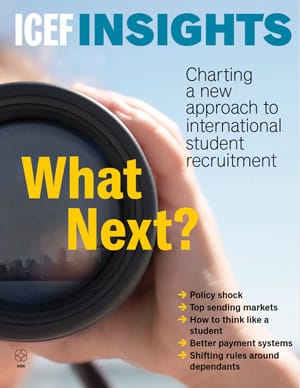Family ties: Where in the world can international students go if they want to bring their family?
- Policies affecting the families of international students have always been important, but they do not usually capture media headlines. That changed this year when Canada, France, and the UK rejigged rules as part of an effort to curb migration.
The following article is adapted from the 2025 edition of ICEF Insights magazine, which is freely available to download now.

Global research consistently finds that quality of education, work rights, career aspirations, tuition fees, and costs of living greatly influence where students choose to study. But another crucial – and less studied – factor for many students is whether their family members (i.e., dependants) can accompany them abroad. If it seems there might be an opportunity to do so, students then explore questions such as:
- Is the right to bring dependants restricted to those studying in certain levels or fields of study?
- Which family members are eligible? Spouses/partners and children? Extended family?
- Can dependants stay for the entirety of a study programme?
- Can spouses/partners work? Full time? In any job?
- Can children attend public schools for free or do tuition fees apply?
Bringing family linked to greater success
The rights of dependants are especially consequential for students intending to study abroad for years, rather than months, and for those aiming to work or immigrate after graduating. The longer students stay abroad, the more likely they are to need their family with them, whether to maintain emotional bonds, help raise children, or integrate family members into the student’s new community.
Consider that:
- International students frequently experience culture shock, social isolation, loneliness, and difficulty making friends when they are studying far from home without their family.
- Research shows that foreign students’ success cannot be measured by their academic performance alone. Another key gauge is a student’s ability to engage with and positively contribute to a host society. This ability increases when students are supported by family and community connections.
Dependants’ rights restricted in some destinations
Policies affecting the families of international students have always been important, but they do not usually capture media headlines. That changed this year when Canada, France, and the UK rejigged rules as part of an effort to curb migration.
Specifically:
- Canada: Only spouses/partners of students pursuing degrees at the master’s (16 months or more), doctoral, or professional level are eligible for an open work permit.
- France: Only if a student has lived in France for at least 24 months may dependants join them, and unmarried partners must be at least 21 years of age, up from 18.
- UK: Dependants can come to the UK only if the student is on a government scholarship or enrolled in a research-oriented postgraduate programme. Family of taught master’s students and undergraduate students cannot join.
The impacts of changes to dependants’ rights are already being felt by educators in Canada and the UK. They are experiencing lower demand from key non-EU markets, especially Nigeria and India, according to various data indicators (e.g., applications, visas processed, deposits, visas granted).
Which countries are the most open to dependants?
The more restrictive rules in effect this year in Canada, France, and the UK are now in line with those in Ireland, Singapore, and the US. Germany and New Zealand offer more opportunities (if students meet certain conditions or are enrolled in certain levels/programmes).

Technically, Australia occupies the middle ground. Spouses/partners and children under the age of 18 may join international students in Australia, and partners can usually work (48 hours per fortnight if the student is an undergraduate and unlimited if the student is in a research-oriented postgraduate programme).
However, partners/spouses must show savings of AUD$10,395, and each child must have funds of at least of AUD$4,450. This is on top of the AUD$29,710 required for the main student applicant. In effect, the amount of savings required of students and their dependants – and the new, non-refundable visa application fee of AUD$1,600 – is enough to discourage many international students with families from applying to Australia.
Canadian institutions, too, are experiencing lower demand this year from Nigeria due to dependant policies.
The coming months will provide a more complete picture of how significantly rules about international students’ families affect destination choice. Our guess is that it will change the decisions of thousands of students who want partners to be able to work, and to have children with them, while they study.
For additional background, please see:
Most Recent
-
AI is changing how students search: What it means for marketing and recruitment Read More
-
Taiwan ramps up international recruiting efforts with expanded work rights and scholarships Read More
-
Studies show countries “at the forefront of research” prioritise international collaborations and mobility Read More
















